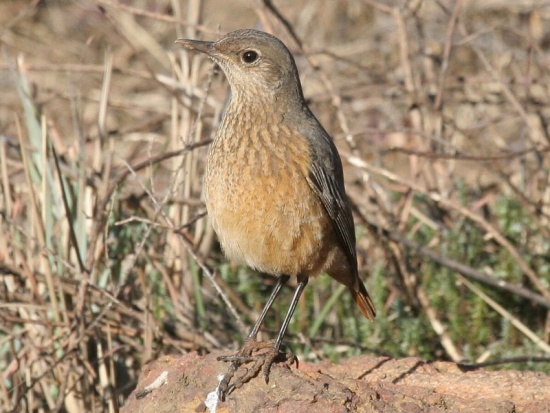(text added) |
(Image of female added) |
||
| Line 1: | Line 1: | ||
;Monticola explorator | ;Monticola explorator | ||
| − | [[Image:Sentinel_Rock_Thrush.jpg|thumb|550px|right|Photo by GarethH<br />Photo taken: Suikerbosrand | + | [[Image:Sentinel_Rock_Thrush.jpg|thumb|550px|right|Photo by GarethH<br />Photo taken: Suikerbosrand Nature Reserve, South Africa]] |
==Identification== | ==Identification== | ||
Length 17 cm, mass about 50 g. '''Adult male''': The head to upper breast and back is a striking blue-grey, contrasting with a rich orange lower breast and belly. The wings are black and grey. The bill is black and the irises are brown. '''Adult female''': Greyish brown with pale mottling above. Throat and breast streaked dark brown on a white to orange background. Belly creamy. | Length 17 cm, mass about 50 g. '''Adult male''': The head to upper breast and back is a striking blue-grey, contrasting with a rich orange lower breast and belly. The wings are black and grey. The bill is black and the irises are brown. '''Adult female''': Greyish brown with pale mottling above. Throat and breast streaked dark brown on a white to orange background. Belly creamy. | ||
| Line 8: | Line 8: | ||
==Taxonomy== | ==Taxonomy== | ||
There are two subspecies: ''M. e. explorator'' from most of the range of the species (Western Cape to Gauteng, Mpumalanga and Swaziland); and ''M. e. tenebriformis'' from Lesotho and KwaZulu-Natal, darker than the nominate race. | There are two subspecies: ''M. e. explorator'' from most of the range of the species (Western Cape to Gauteng, Mpumalanga and Swaziland); and ''M. e. tenebriformis'' from Lesotho and KwaZulu-Natal, darker than the nominate race. | ||
| + | [[Image:Sentinel_Rock-Thrush_F_GarethH_Suikerbosrand_Jun_2006.jpg|thumb|550px|right|Photo by GarethH<br />Photo taken: Suikerbosrand Nature Reserve, South Africa]] | ||
==Habitat== | ==Habitat== | ||
Grasslands, heathlands, fynbos and other open habitats, often on rocky slopes. | Grasslands, heathlands, fynbos and other open habitats, often on rocky slopes. | ||
Revision as of 07:24, 7 December 2007
- Monticola explorator
Identification
Length 17 cm, mass about 50 g. Adult male: The head to upper breast and back is a striking blue-grey, contrasting with a rich orange lower breast and belly. The wings are black and grey. The bill is black and the irises are brown. Adult female: Greyish brown with pale mottling above. Throat and breast streaked dark brown on a white to orange background. Belly creamy.
Distribution
Southern and eastern South Africa, Lesotho and Swaziland.
Taxonomy
There are two subspecies: M. e. explorator from most of the range of the species (Western Cape to Gauteng, Mpumalanga and Swaziland); and M. e. tenebriformis from Lesotho and KwaZulu-Natal, darker than the nominate race.
Habitat
Grasslands, heathlands, fynbos and other open habitats, often on rocky slopes.
Behaviour
Solitary, in pairs, or in small groups. Fairly active and often perches conspicuously. Forages on the ground (often from a low perch) mainly for insects, but also other invertebrates, seeds and fruit.
References
Hockey PAR, Dean WRJ & Ryan PG (eds) 2005. Robert's Birds of Southern Africa, 7th edition. John Voelcker Bird Book Fund, Cape Town, South Africa. ISBN 0620340533





